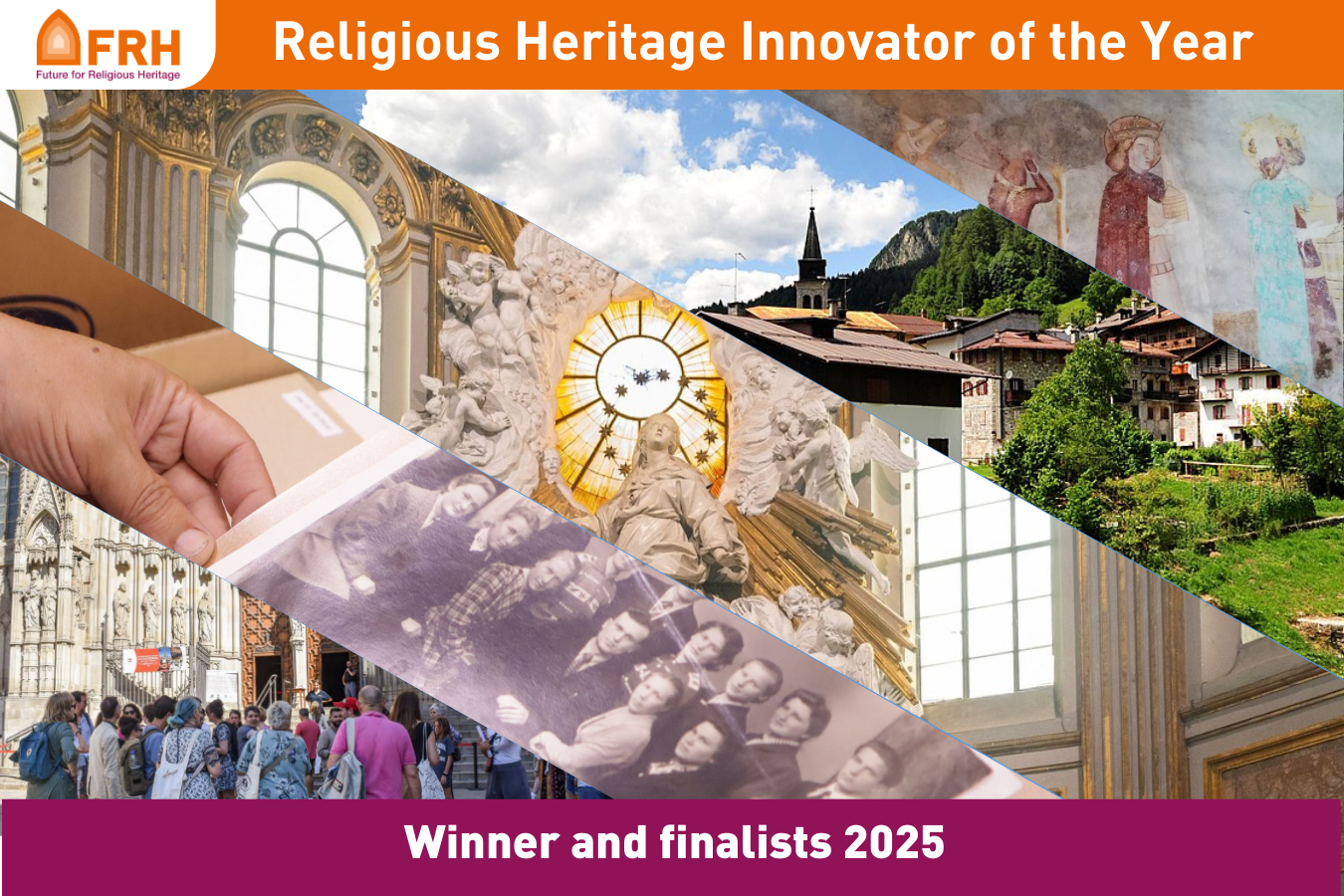
Brussels, 21 November – Future for Religious Heritage is thrilled to announce the 2025 winner and four finalists of the Religious Heritage Innovator of the Year 2025, an annual award recognising pioneering projects to understand, protect, enhance and promote European historic places of worship across Europe.
This edition was marked by a high number of cross-border collaborations focusing on community building, and interfaith engagement. The jury meeting to select the five best projects took place on 9 October 2025. After a thorough evaluation process, the jury chose the most innovative and groundbreaking initiatives in line with the five pillars of the European Commission’s Framework for Action for Cultural Heritage: cooperation, innovation, inclusion, resilience and sustainability.
The winner of 2025 is MUDD – Museo Diocesano Diffuso Di Napoli by the Fondazione Napoli C’entro – Arcidiocesi di Napoli (Italy).
The four finalists are Remettre l’église au centre du village (Putting the Church Back at the Heart of the Village), by ESA Paris and led by Paul LEVRAT, architecture student; Saving Ukraine’s Religious Heritage: Digitization and Preservation of Endangered Minority Archives, by an international consortium led by the University College Cork (Ireland); Sacred Past Project: Promotion of the Religious Heritage in the Carpathian Basin, a crossborder initiative led by Symmetry Foundation (Hungary); and REBELAH (Religions, Beliefs, and Laicity in Cultural Heritage to Foster Social Inclusion in Adult Trainings), involving six organisations under the coordination of La Xixa Teatre (Spain).
The competition jury was composed of Anne Grady (Head of Development with the National Museum of Ireland to the CULT Committee of the European Parliament), Gilles Guey (President of the Association of Directors of Culture of French Large Cities and Urban Areas), Justin Kroesen (Professor of Cultural History at the University of Bergen), and Greg Pickup (Chief Executive of the Churches Conservation Trust).
The selected projects will be celebrated at an award ceremony which will take place as part of the next FRH Biennial Conference, (October 2026 in Leuven, Belgium).
Winner – ‘MUDD – Museo Diocesano Diffuso Di Napoli’, by Fondazione Napoli C’entro
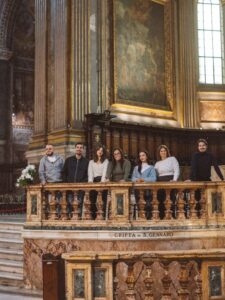 Our overall winner for 2025 is the Fondazione Napoli C’entro, an organisation founded in 2024 by the Archdiocese of Naples, with the aim of tackling two urgent needs in the Rione Sanitá district: youth unemployment and the restoration and revitalisation of Naples historic churches. The MUDD – Diffused Diocesan Museum of Naples, is the realisation of this goal: a project that transforms religious heritage into opportunities for young people.
Our overall winner for 2025 is the Fondazione Napoli C’entro, an organisation founded in 2024 by the Archdiocese of Naples, with the aim of tackling two urgent needs in the Rione Sanitá district: youth unemployment and the restoration and revitalisation of Naples historic churches. The MUDD – Diffused Diocesan Museum of Naples, is the realisation of this goal: a project that transforms religious heritage into opportunities for young people.
Rather than being a single museum space, MUDD is a living, evolving initiative comprising a network of historic churches that have been reopened to be public and local community (such as Naples Cathedral, Saint Aniello a Caponapoli, San Giovanni a Carbonara, and San Giorgio Maggiore), and more which are undergoing restoration. The MUDD is also structured around four thematic itineraries designed to explore and celebrate Naples’ sacred heritage: the Ianuarian Itinerary, the holiest of Neapolitans, The Golden Mile, and MUDD Vomero.
Through this, the MUDD promotes religious heritage valorisation, youth employment, engagement of visitors and local community, and a sustainable model for cultural heritage management.
The jury selected them as the overall winner for putting the community at the heart of the project and empowering local youth, all in an initiative coming from the Archdiocese itself.
More information about this project: https://muddnapoli.it
Finalist – ‘Remettre l’église au centre du village’ by ESA Paris (France)
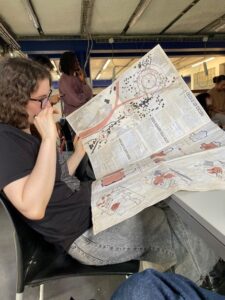 This in-progress project envisions a comprehensive plan to revitalise three historic churches in Forni di Sopra, a small Alpine village in northeast Italy. The aim is to integrate cultural, social, and essential services into these sacred spaces through non-invasive and reversible architectural interventions, ensuring that their religious functions are preserved while addressing local needs.
This in-progress project envisions a comprehensive plan to revitalise three historic churches in Forni di Sopra, a small Alpine village in northeast Italy. The aim is to integrate cultural, social, and essential services into these sacred spaces through non-invasive and reversible architectural interventions, ensuring that their religious functions are preserved while addressing local needs.
– The Chiesa Madonna della Salute, at the village’s heart, is planned to host essential community services as medical care and banking facility, through modular, removable installations.
– The Parrocchia di Santa Maria, the largest of the three, is a suitable place to serve as a dynamic cultural venue for exhibitions, theatre, concerts, and film screenings, facilitated by a removable stage.
– The Chiesa di San Giacomo, the smallest of the three, will be reserved to the local community as a space to gather and connect with each other.
The jury selected this project for its sensitive and sustainable approach to heritage reuse, which seeks to strengthen local life, support tourism, and preserve religious heritage in meaningful and practical ways. Such a community-driven initiative can be inspirational to other rural areas in Europe.
Finalist – “Saving Ukraine’s Religious Heritage: Digitization and Preservation of Endangered Minority Archives”, by University College Cork (Ireland)
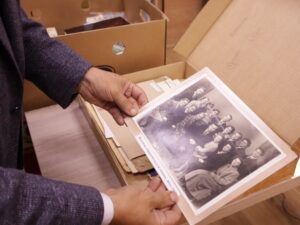 As Ukraine’s cultural heritage faces existential threats due to the ongoing war, this project focuses on the digitisation and preservation of religious minority archives that are at critical risk of destruction, theft, or loss. These archives, often unregistered and privately held, have lacked institutional protection or professional care.
As Ukraine’s cultural heritage faces existential threats due to the ongoing war, this project focuses on the digitisation and preservation of religious minority archives that are at critical risk of destruction, theft, or loss. These archives, often unregistered and privately held, have lacked institutional protection or professional care.
These materials include samizdat publications, Soviet-era surveillance documents, photographs, manuscripts, religious artifacts, and firsthand testimonies of persecution and resistance.
By training archivists, digitising collections, and making them accessible, the project safeguards Europe’s endangered religious heritage, preserving the memory and cultural identity of Ukraine’s minority communities, while empowering them to reclaim their narratives and claim their place in Ukraine’s historical record.
According to the judges, this project deserves a special mention because not only has it established an international network ensuring the exchange of expertise in safeguarding religious heritage, but it also plays a key role in rescuing and digitising Ukraine’s religious heritage of its minorities. It provides for the long-term preservation of critically endangered religious minority archives in Bucha, which were damaged during the 2022 occupation and it is the cornerstone for strengthening community identity, peacebuilding and reconciliation.
More information about this project:
Finalist – ‘Sacred Past Project: Promotion of the Religious Heritage in the Carpathian Basin’, by Symmetry Foundation (Hungary)
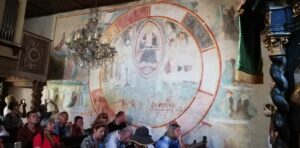 “Oltári Múlt” (“Sacred Past”) is a cross-border initiative to connect religious heritage sites in the Carpathian Basin through a growing network of cultural routes. Coordinated by the Symmetry Foundation, the project involves collaboration with nearly 20 organisations across Hungary, Slovakia, Serbia, Romania and aspires to extend its partnerships to neighbouring countries like Ukraine, Croatia, Slovenia, and Austria
“Oltári Múlt” (“Sacred Past”) is a cross-border initiative to connect religious heritage sites in the Carpathian Basin through a growing network of cultural routes. Coordinated by the Symmetry Foundation, the project involves collaboration with nearly 20 organisations across Hungary, Slovakia, Serbia, Romania and aspires to extend its partnerships to neighbouring countries like Ukraine, Croatia, Slovenia, and Austria
Their goal is to make the abandoned, neglected, or underused medieval churches more attractive by involving residents and tourists in dynamic study visits to address contemporary challenges and raise awareness. As many of these religious sites have no interpretation infrastructure and local site interpreters, the Symmetry Foundation created a network of heritage interpreters accompanying participants in the tours.
The project has also developed inclusive heritage education programs for varied audiences, including elementary and secondary school students, people with disabilities, and Roma youth, helping them reinterpret and reconnect with religious heritage in dynamic ways.
For the jury, this proposal stands out for its social component, by actively promoting community-building around heritage, and inviting diverse social groups, including Roma, youth and people with disabilities, to become interpreters of heritage through a series of educational programmes adapted to the needs of each social group.
More information about this project: https://oltarimult.hu/
Finalist – ‘Rebelah’, by an international consortium led by La Xixa Teatre (Spain)
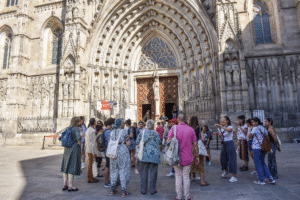 REBELAH (Religions, Beliefs, and Laicity in Cultural Heritage to Foster Social Inclusion in Adult Trainings) is an EU-funded initiative that explores the power of religious and cultural heritage as a vehicle for dialogue, education, and inclusion.
REBELAH (Religions, Beliefs, and Laicity in Cultural Heritage to Foster Social Inclusion in Adult Trainings) is an EU-funded initiative that explores the power of religious and cultural heritage as a vehicle for dialogue, education, and inclusion.
The project developed a new methodology for adult education, focusing on heritage activities, that invite adult learners to explore Europe’s diverse cultural and religious past, understand the role of heritage in cultural identity, explore changing narratives around heritage (especially minority religious heritage) and being aware of its contested nature.
These methodologies were compiled in two publications digital publications that were later published by the Groningen University Press:
- 1) Creative and Inclusive Heritage Education: A Handbook
- 2) Creative and Inclusive Heritage Education: An Activity Book.
It is a clear example on how diverse heritages, even when contested, can be used as a tool for cross-cultural understanding. The handbooks allow adult educators to confidently navigate complex areas.
The jury noted that intercultural and interreligious dialogue is an important area to which the heritage sector can contribute, and valued the fact that this project provides a set of tools for doing so in a coherent, meaningful and impactful way.
More information about this project: https://www.rebelah.org/
_____________________________________________________________________________________________
Note for the editors
Future for Religious Heritage (FRH) is an independent, non-faith, non-profit European network founded in 2011 and based in Brussels to promote, encourage and support the safeguard, maintenance, conservation, restoration, accessibility and embellishment of historic places of worship.
The network represents more than 80 organisations and 200 individuals working to protect and promote religious heritage across Europe. Members include NGOs, governmental organisations, religious bodies, university departments, researchers, academics and people with an interest in religious heritage.





Follow us: